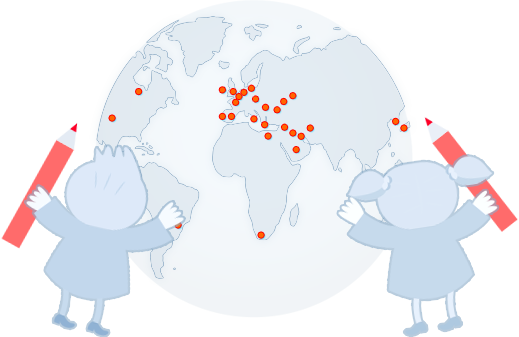Parent guide for online security education
Gyorgy GASPAR, Psychologist
Child and Family Psychology Expert
Collaborator of the Save the Children Organization and of the Romanian Institute of Integrative Psychotherapy
www.
Message for parents
The education of children and teenagers should be constantly adjusted to life circumstances defining our age. There is not a perfect child or parent, there is only a good enough parent who permanently learns and considers the needs of a balanced development of their children. The world of our age has significantly evolved and it is thus important to develop child education and discipline strategies. Parents nowadays need to mix their personal parenting strategies with online security education approaches to reduce as much as possible child vulnerability factors and to teach children to enhance their responsibility as regards a safer and more secure lifestyle.
Parents possess the resources necessary for a healthy education, but they also need information and positive conduct models and crisis management skills.
Useful information for parents
Many families worldwide use the Internet on daily basis for various reasons: education, research, shopping, investments and to post photos, to unload materials or to socialize. Nowadays, the Internet offers a series of benefits and opportunities, but it also involves risks that might affect families and their members.
IT professionals and family psychology experts work hard to develop suitable solutions for the use of the Internet in order to maintain the safety of children who come in contact with the wide world of the Internet. Since the access to the virtual world has increased, the exposure of children to Internet vulnerabilities has increased as well. There are increasingly frequent cases of physical and emotional abuse that do not involve direct contact with the abuser. Aggressors use the Internet interest and motivation of children and resort to different actions and conducts that can sometimes have very unpleasant consequences on children and teenagers.
Security services for Internet use are a protective measure that can significantly reduce children's access to inappropriate sites, but do not replace the responsibility of parents to develop and implement a plan to protect the entire family. Such protection plan involves a number of basic rules that increase family security and can be easily implemented once parents have been properly informed.
I often tell parents that the education of their children must include today notions about the use of the Internet. Parents can start the "online security education" of their children as soon as they become interested in the use of computers.
Risk statistics

The chance for a member of your family to be victim of online aggression is 1:41.

Every 39 seconds hackers attack an Internet connected computer.

Over 70% of children aged 13-17 receive regularly online messages from strangers.
9 rules to protect your family
1. Computer place
In a family with children, where to place the computer is a very difficult decision. The most suitable place is the most circulated area of the house.
2. Work in team
Decide with your partner on the schedule and conduct of your child when using the Internet. It is important to select the websites and chat rooms accessible to your child and make sure that they are constantly monitored. Moreover, decide on the topics and language that the child is allowed to use when socializing online.
3. Disseminate the main rules of conducton the Internet
Parents are advised to explain to the child the purpose of such rules of conduct and to make sure that the child has understood their importance. The main conducts that should be avoided on the Internet and when interacting with strangers are:

To disclose your identity;

To disclose email access codes;

To disclose phone numbers;

To post personal information;

To post photos disclosing personal addresses;

To avoid interactions with strangers;

To avoid meeting strangers met on the Internet.
Write these rules and make sure that your child sees them when (s)he is in front of the computer.
4. Online conduct agreement
Once the conduct rules are discussed, it is important to write them as a contract and to make sure that all family members know about the advisable and inadvisable conducts on the Internet (see the last page).
5. Security filter
Install a security filter and make sure it works properly.
6. Monitor your child
Even the most efficient security solutions cannot replace parent control. Take the necessary time: nothing can replace the monitoring of a responsible parent when the child surfs the Internet.

7. Remind your children that people onlineare only strangers
It is important for all family members to understand it. It does not matter how often, how long you chat online or what your feelings and mood are, people met online are only "strangers". It is very easy to lie on the Internet and to claim you are a different person. People who chat with children on the Internet are often adults with hidden intentions. Social networks such as My Space or Facebook are ideal places to meet new people. Therefore, parents should sometimes monitor their children's activities on these websites and to make sure they are not exposed to risks.
8. Create strong passwords
To make your password difficult to hack, use at least 8 characters and a combination of letters, numbers and symbols. These passwords should also be changed regularly to avoid them to be compromised in time.

9. Be informed
Your family's safety is stronger when you are informed. Check www.navitron.net periodically. It posts useful information for parents concerned with online security education.
The ABC of online security
Pre-teenagers (aged 3-7)
A. Talk to your child
When you train your child on online security education, make sure (s)he pays attention (the computer is turned off and the child is not focused on external stimuli). Start by telling her/him that the computer is only a tool and the Internet is a giant electronic library full of information. Explain why it is important to protect ourselves online using words and phrases that the child can understand easily ("the Internet is like an open door to personal information"). Tell her/him about the aggressors who can take control over the family's computer and destroy it, forcing you to buy a new one. Remind your child that (s)he should not use their own identity and to not disclose information about their home or school.
B. Make a list of computer rules
This list can include the following rules:

Ask for your parents' permission to unload music or software from the Internet onto the family computer;

Use only the social networks that can be monitored by a parent;

Ask for your parents' permission to post a photograph of you on the Internet;

Use decent language without obscenities or insults;

Do not access adult websites or websites displaying violence, sexuality or insults;

Talk to and interact only with people you know: colleagues, friends or family members;
C. Use child-friendly browsers or search engines
Make sure that the computer browser does not expose the child to indecent words or images. Check if your protection software filters websites inappropriate for children.
Pre-teenagers (aged 8-12)
A. Talk to your preteen child
The preadolescent period brings with it many challenges in the family life in general and in the relationships between parents and children in particular. (Pre)teen age can be seen as a transitional stage between childhood and adulthood. It is a "tunnel" where children disappear and become adults later. Once children grow up, the system of rules should become more flexible and adapted to the personal development of the child, respecting the limits and rules. Learn to practice patience, humor and compassion in the relationship with preteens. To keep a (preteen) child safe, it still is important to have answers to a series of questions such as:

Is the computer placed in the most circulated area of the house?

What are the websites that a preteen can access safely?

How long can a preteen spend online?

What does a preteen do when browsing the Internet?

Who are the people a preteen interacts with on the Internet?
Once you have answered these questions, continue the preteen's online security education and make sure your child's attention is focused on the topic of your discussion. Your discussion should approach the following:

The impact of viruses, hackers or cybercriminals;

The profile of an online aggressor hunting preteens interested in and motivated to socialize online;

Explain how important online security education is;

Ask for feedback to make sure that the preteen has understood your message.
B. Encourage the preteen to talk to you
Listen carefully to the concerns or worries of your preteen child and avoid criticizing them for wrong decisions, in general, and the use of the Internet, in particular. If you punish your child for telling you about a mistake, the chances are he/she will avoid talking to you about their difficulties or mistakes in the future. Moreover, monitor the online conduct of your preteen child to make sure (s)he is not a victim or aggressor.
C. How can you protect your child and how do you report problems?
Inappropriate discussions can be copied and stored in a word processing software. These messages can be later sent to the website or forum administrator to take the measures stipulated by the provider. The administrator contacts are posted on the website.
Teenagers (aged 13-18)
A. Train your teenage child
As you used to discuss about traffic rules before your child had a driver's license, you can equally train her/him on the online rules before ceasing any monitoring. The main difference between driving and browsing is that the virtual world does not have any signs to ensure smoothness and lack of incidents. It is important for a teenager to know that both a car and a computer are extremely powerful and dangerous vehicles.
B. Remind your teenage child that people met online are strangers
It does not matter how often they communicate online or how well they imagine they know the person met online – that person is still a stranger. People can lie a lot online. People met online are often different than what they truly are.
C. Check the online profile of your teenage child posted on social networks
Make sure that your teenage child has not posted personal information on social networks that could enhance family vulnerability. Moreover, check if posted photos are provocative or promote anti-social messages.
Parent-child agreement template on acceptable Internet conduct
Online Conduct
AGREEMENT
Since the use of the Internet is a privilege, I will make sure I will not lose it.
Conducts accepted while using the Internet:

To abide by the safety rules when I browse, search, read, play or communicate on the Internet.

I shall not disclose the identity, home address, phone numbers, access codes or emails of my virtual "friends";

I shall never meet people I have met online (without my parents' consent or presence);

I shall browse forbidden or high-risk websites only in my parents' presence;
I hereby undertake to comply with this agreement and I accept the responsibility arising from my personal decisions.
Signature of the child
As parent, I hereby undertake to assist and support you to the best of my abilities when you need to solve whatever problems.
Signature of the parent


 English
English










 Romana
Romana
